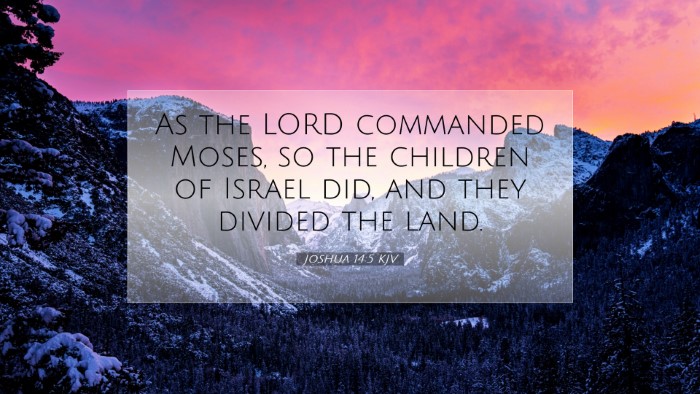Old Testament
Genesis Exodus Leviticus Numbers Deuteronomy Joshua Judges Ruth 1 Samuel 2 Samuel 1 Kings 2 Kings 1 Chronicles 2 Chronicles Ezra Nehemiah Esther Job Psalms Proverbs Ecclesiastes Song of Solomon Isaiah Jeremiah Lamentations Ezekiel Daniel Hosea Joel Amos Obadiah Jonah Micah Nahum Habakkuk Zephaniah Haggai Zechariah MalachiJoshua 14:5
Joshua 14:5 KJV
As the LORD commanded Moses, so the children of Israel did, and they divided the land.
Joshua 14:5 Bible Commentary
Bible Commentary on Joshua 14:5
Verse Context: Joshua 14:5 states, "As the Lord commanded Moses, so the children of Israel did, and they divided the land." This verse is crucial as it signifies the obedient execution of God's command and the fulfillment of His promises to the Israelites as they entered the Promised Land.
Overview of the Commentary
This commentary synthesizes insights from esteemed public domain scholars, including Matthew Henry, Albert Barnes, and Adam Clarke, to provide a comprehensive understanding of this pivotal verse. The focus will delve into themes of obedience, divine promise, communal inheritance, and expectations of faithfulness from God’s people.
Historical Context
The division of land among the tribes of Israel marks a significant transition for the people of God. After years of wandering in the wilderness, they were finally entering the land promised to their ancestors. The verse emphasizes the link between God's commands and Israel's actions, highlighting a model of faith culminating in divine blessing.
Thematic Insights
-
Obedience:
Matthew Henry notes that the children of Israel acted in accordance with the command of Moses, demonstrating a commitment to obedience. Their compliance is a testament to the importance of following God's directives, which often come through appointed leaders.
-
Divine Promise:
Albert Barnes elaborates on how this division of land is a fulfillment of God's promise to Abraham, Isaac, and Jacob. The narrative encourages believers to reflect on God's unwavering faithfulness in keeping His covenant promises throughout generations.
-
Community and Inheritance:
Adam Clarke highlights that the act of dividing the land was not just an individual affair but rather a collective experience for the nation of Israel. Each tribe's inheritance represents God's provision and care for His people, teaching them about their shared identity as His chosen people.
-
Role of Leadership:
The passage underscores the importance of leadership in spiritual and communal settings. Joshua, as a leader appointed by God, ensures that the directives given to Moses are fulfilled. This approach mirrors the idea that faithful leaders facilitate the people's obedience to God's commands.
-
Expectations of Faithfulness:
In light of this fulfillment, the commentary encourages reflection on the expectations God places on His people. The act of obedience must match the blessings received, emphasizing that faith must be accompanied by action.
Theological Reflections
This verse serves as a reminder of the intricate relationship between divine sovereignty and human responsibility. The act of dividing the land illustrates God's providential arrangements while simultaneously affirming the necessity of human response to God's leading. The faithful actions of Israel illuminate a broader biblical theme: God's promises demand a response of faith from His people.
Practical Applications
-
Encouragement for Obedience:
For pastors and theologians, this passage encourages the preaching of obedience not merely as duty but as a pathway to experience God's faithfulness and blessings. Obedience is foundational in the life of any believer or community seeking to follow God's will.
-
Celebration of God’s Promises:
Students of the Bible should take time to reflect on God’s promises throughout Scripture, understanding how His faithfulness in past covenant relationships informs current faith practice and community life.
-
Importance of Shared Inheritance:
The communal aspect of inheritance speaks to the identity of the church as the body of Christ, collaborating together for the common good and the advancement of the Gospel. This aspect invites communities to live out their faith collectively.
-
Leadership Dynamics:
Current church leaders might find inspiration to lead with integrity and clarity, understanding that their role includes guiding others in obedience to God's commands while ensuring that the community remains united and focused on divine promises.
Conclusion
Joshua 14:5 offers rich insights into the character of God and the necessary response of His people. The passage affirms that obedience to God's Word yields blessings and reveals His faithfulness in fulfilling promises. It serves as a powerful reminder of the collaboration required between divine sovereignty and human agency, calling believers into both action and faithfulness.


